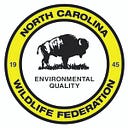North Carolina Wildlife Federation (NCWF) is tackling critical conservation issues head-on with Trees4Trash (T4T), a new habitat restoration program launched in partnership with Plastic Ocean Project in alignment with NCWF’s 75th anniversary.
There is no shortage of online videos showing heroic people saving wildlife from being entangled, impaled, and strangled by plastic bags, six-pack rings, straws, and other trash. We’ve all watched nearby streams and creeks collect debris and become coffee-like, thick from development runoff, and watched as wildlife lose its habitat when acres of trees are cut down for development.
T4T will mobilize thousands of volunteers to remove trash from neighborhood open spaces, waterways, and public lands and then plant native trees and pollinator plants in their place. For every 25 pounds of trash collected, one tree will be planted with the goal of removing thousands of pounds of plastics and trash and planting hundreds to thousands of trees.
“Something needed to be done after recent hurricanes in Wilmington to inspire people to come out and do these very important clean-up efforts and replant trees, so we can get back the canopy we lost,” explains Bonnie Monteleone, Executive Director of Plastic Ocean Project and NCWF Board of Director.
It’s a simple but important premise, Monteleone points out, “Removing what doesn’t belong in the environment and replacing it with what does.”
NCWF also signed on to federal legislation called the “Break Free from Plastic Pollution Act,” that tackles the tidal wave of plastic pollution and chart a new course for the future.
Connecting and engaging communities
T4T supports the connectedness of water quality, humans and wildlife, forest cover and habitat. Through this program, we’re creating conservation communities and promoting habitat restoration.
Trees are the building block for a lot of our habitat ecosystems, whether they’re providing nesting for owls, hawks and songbirds, resting areas for turkeys at night, or the forage they’re providing from the seeds, nuts and fruits they bear.
T4T is especially timely with increased awareness and concern about the improper disposal of single-use plastics, which causes problems for wildlife, and also negatively affects water quality and neighborhood appeal.
Thanks to a grant from Duke Energy Foundation, T4T kicks off in partnership with Plastic Ocean Project in Wilmington and other coastal communities with plans to expand to Charlotte later this year and eventually statewide. Community Wildlife Chapters in Wilmington and New Bern will engage hundreds of conservation-minded individuals in caring for and taking action on behalf of wildlife and habitats in their own communities.
Wildlife protection, habitat restoration
Removing trash and planting native species helps restore complex ecosystems that can provide residents with healthier water and air and moderate temperatures. T4T efforts help wildlife thrive and provide critical wildlife corridors for migratory butterflies and birds.
In addition to removing trash from urban environments and planting trees and pollinator plants, T4T will help:
- Protect wildlife from entanglement, strangulation and ingestion of trash;
- Increase tree canopy and enhance habitat;
- Improve water quality and reduce sediment load;
- Remove carbon dioxide from the environment;
- Improve neighborhood appeal and property values; and
- Engage and strengthen communities.
Climate resiliency and coastal communities
Launch of the T4T program addresses a wider issue affecting wildlife and their habitats throughout North Carolina: Climate change.
Climate has a tremendous impact on our state through rising sea levels and increased frequency of superstorms have caused our coastal communities to lose trees at an alarming rate.
Storms also compound the amount of manmade debris entering our rivers, waterways and estuaries. Wildlife is at great risk of losing habitat and facing further declines.
For example, many loggerhead sea turtle eggs don’t hatch after disastrous storms and hurricanes because they’re submerged or washed away. Runoff and sedimentation flowing into rivers and waterways causes pollution, resulting in die-offs of fish, oysters and other aquatic species.
Strengthening community conservation
One goal of T4T is to help North Carolina communities reduce barren landscapes and create green infrastructure throughout urban and suburban environments. The program encourages people to develop an ethic of environmental stewardship and be part of a sustained and inclusive conservation network.
Combining individual and collective efforts is the key to immediate conservation results. It also serves as an entry point as we build a community of conservation-minded citizens who are ready to engage in future conservation projects.
To participate in T4T, contact NCWF Director of Conservation Partnerships, Tara Moore, at tara@ncwf.org. To invest in this program and other NCWF wildlife and habitat efforts, please donate today.
You can also peruse the NCWF Wish List on Amazon and purchase an item to be used during T4T habitat clean-ups and habitat restoration. The items are shipped directly to NCWF from the supplier. Please include your contact information in the gift note section when completing your gift item purchase so we can thank you and provide a gift-in-kind receipt for your records.
